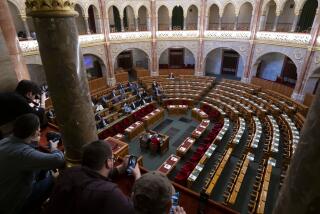Estonia Loses Lithuania’s Support in Sovereignty Bid
MOSCOW — About 10,000 people staged a protest rally in the capital of Soviet Lithuania today after their Parliament failed to support nearby Estonia’s demand for sovereignty, Lithuanian sources said.
The lawmakers did declare the flag of the formerly independent republic its new banner, raising it over their Parliament building, and declared Lithuanian to be the official language.
But Sajudis, a powerful Lithuanian mass movement, accused the republic’s Parliament members of “treason” for not backing up Estonia and called a 10-minute transport strike for Monday.
“We have treacherously knifed the Estonians in the back,” Sajudis declared after Parliament today stepped down from demands that it should follow Estonia and vote itself the right to refuse to apply Soviet laws in its territory.
No Resignations
Meanwhile, a member of the Estonian Parliament’s ruling presidium indicated after a top-level meeting in Moscow that the republic’s leadership would not resign over the sovereignty issue despite a Kremlin announcement that it is unconstitutional.
The official, Arno Almann, told an interviewer on the republic’s television that there was “no reason to panic,” an Estonian journalist said.
Almann said the Estonian delegation, under President Arnold Ruutel, explained during talks with Soviet Vice President Anatoly Lukyanov that their vote had been intended merely to make the Kremlin’s perestroika (or reorganization) drive irreversible.
He said that Lukyanov had listened to what the Estonians had to say but gave no indication of what would be the next stage in what has become a potential constitutional crisis, the journalist said.
Gorbachev Visit
Kremlin leader Mikhail S. Gorbachev, who launched the perestroika drive, was on a state visit to India.
Lithuania’s Sajudis was angry at the decision by the republic’s Parliament to refer to a special commission the question of a new constitution for the republic, rejecting demands that it should be approved out of solidarity with nearby Estonia.
After an impassioned appeal from Lithuanian Communist Party leader Algirdas Brazauskas, the Parliament also only partially rejected a Kremlin draft law on the constitution and electoral reform.
More than 1.8 million people in the republic had signed petitions calling for the Kremlin proposals to be completely rejected in a upsurge of unrest across all three Soviet Baltic republics.
More to Read
Sign up for Essential California
The most important California stories and recommendations in your inbox every morning.
You may occasionally receive promotional content from the Los Angeles Times.










